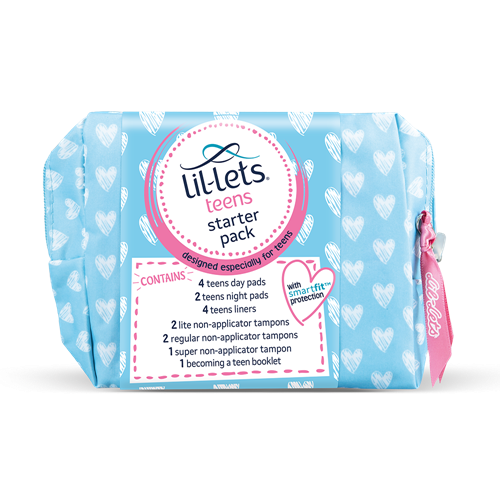We get it periods can feel like a lot at first! But don’t worry, we’ve got you covered. This is your go-to guide for understanding your flow and finding the right products now that your period has started.
Getting your first period can feel like a really big deal. And with so many products and tips out there, it’s easy to feel a little overwhelmed. Once it starts, it can seem like you’re just supposed to know what to do — but how are you supposed to know if no one’s ever explained it?
Don’t worry, you’re not alone, and you don’t have to figure it all out by yourself. Let’s break it down together.
If your new to periods the three most important things to understand are: your flow (how much blood you have and how it changes), your cycle (how often your period comes), and what products suit your needs (like pads, tampons, or period underwear). Learning about these will help you feel more confident and in control.

Period flow is just a way of describing how much blood comes out of your body during your period.
Everyone’s flow is different, and it can even change from day to day. Some days you might bleed a little, and other days a bit more. That’s totally normal!
Knowing your period flow, how much blood comes out each day can really help you feel more confident and in control during your period.
Here’s why it matters:
It helps you choose the right products
If your flow is light, you might only need a pantyliner. If it’s heavier, you’ll need a thicker pad or tampon. The right product = better protection.
It helps you stay clean and comfortable
Changing your pad or tampon at the right time keeps you feeling fresh and comfortable throughout the day.
It helps prevent leaks
When you know your flow, you can plan ahead, like wearing a night pad to bed or packing an extra pad in your bag for school.
Don’t worry if the colour changes during your period that’s completely normal and happens to everyone.
The menstrual cycle is the time from the first day of one period to the first day of the next, when your body gets ready to have a period again.
As well as learning about your flow, it’s also helpful to count the days of your menstrual cycle. Even though your cycle might be a bit irregular at first (that’s totally normal!), tracking it can help you:
Not everyone’s period comes exactly once a month — a normal menstrual cycle can be anywhere from 21-34 days, and it might change a bit each time, especially when you're just starting out.

Keeping track of your period days can help you understand what’s happening with your body and which products you might need each day.
Everyone’s period is a little different, but here’s a general idea of what it might look like:
By paying attention to how your period changes, you’ll start to learn what’s normal for you and that helps you feel more prepared!
Once you’ve started to notice how much you blood is released during your period (your flow), you can start choosing the products that work best for you. There are lots of options, so here’s a simple guide to help you choose:
If it’s your first period, pads are a great place to start. They’re easy to use, comfy, and sit in your underwear.
For light to medium flow, try teen-sized pads or pantyliners.
For heavier flow, use longer or night-time pads for extra protection.
Top Tip: You’ll probably need to change your pad every 3–5 hours during the day, and when you are new to periods.
It’s smart to carry a little period kit in your bag - just in case! You can buy one like the Lil-Lets Starter Pack, or make your own with:
Once you’re more comfortable, you might want to try:
Check out our How To Guides, for advice on how to use all of these products.


A period kit is like your little emergency helper, it’s a small bag you can keep in your school bag, locker, or backpack with everything you might need if your period starts unexpectedly. It can save you from stress, mess, or having to ask someone for supplies. Just having it with you can make you feel more confident and prepared, no matter where you are!
Lil-Lets Teens Starter Pack
Designed to be worn outside the body.

Worn inside the body for greater protection from leaks and to reduce odour and are perfect for swimming.
We always advise wearing pads for the first few periods you have, so you can get used to your flow and menstrual cycle.
When you do feel ready to use tampons, the great news is that you will have plenty of choice.

Worn inside the body and can be reused time and time again.

Whether you choose to use just one type of period product, or mix and match based on your flow, activity, or comfort. It’s all about what works best for you!
Check out Ask Vicki's FAQ's below.
Confused about whether you need a pad or a liner, we've got the lowdown on what product best suits your needs.
Pads vs LinersYour first period is a big step, and it’s totally normal to have questions about it. Here’s everything you need to know to feel prepared and confident:
My First PeriodPuberty can be confusing, but staying clean and confident doesn’t have to be. Learn simple hygiene tips every girl should know.
Puberty & Intimate Hygiene: A Simple Guide for Girls
Your flow is how much blood comes out during your period. It can be light, medium, or heavy, and it might change from day to day. Everyone’s flow is different, and that’s totally normal!
If you’re changing your pad or tampon every few hours and it’s full, your flow might be heavy. If it takes longer to fill or just has a few spots, it’s probably light. You’ll learn what’s normal for you over time.
Your cycle is the number of days from the start of one period to the start of the next. Most cycles are around 21 -34 days, but they can be shorter or longer — especially when you’re just starting out.
It's absolutely normal for first periods to be irregular. In fact it can take a couple of years for your cycle to settle into a pattern. Stress, growth, and even changes in sleep or food can affect it too!
Yes! You can use pads one day, tampons the next, or wear period underwear as backup. It’s all about what works best for you.
Usually every 4–6 hours, or sooner if it feels full for both pads and tampon, Never leave a tampon in for more than 8 hours though.
They’re actually the same thing! Both mean the number of days from the start of one period to the start of the next, it’s just called a “monthly cycle” because it usually happens about once a month.
You should start counting your cycle from the first day you see blood, that’s Day 1 of your period.
Then, count each day until your next period starts. The number of days between those two periods is the length of your cycle.
And don't worry if at first there are short or long gaps in between each one, your body is still working out the right cycle just for you!